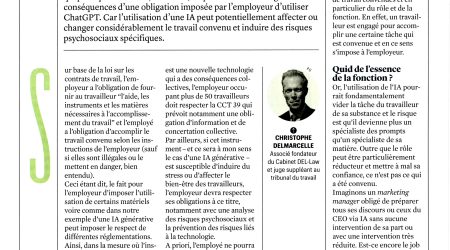Cancellation of cash for cars
Posted the 6 February 2020The "cash for cars" was announced as the remedy to the company car issue. Through a series of small "one-off" measures, the concept of remuneration has been undermined to the point of creating discrimination between workers.
By tinkering, the concept of remuneration has been distorted.
By a ruling on January 23, the Constitutional Court annulled the law of March 30, 2018, "concerning the establishment of a mobility allowance," meaning the "cash for cars" system or the exchange of a company car for a mobility (cash) allowance.
The Court considers that this legislation creates discrimination and a tax inequality – between workers with a company car and those without – that is not validly justified. Furthermore, the Court notes that it has not been demonstrated that the measure reduces the number of company cars.
The concept of remuneration is central in Belgian law, whether in labor law, taxation, or social security law. This definition varies slightly between these three areas, but the common point remains that it is the compensation for the work performed. It doesn't matter whether it is paid in cash or in kind, with a maximum of 1/5 in benefits.
And this compensation is subject to taxes and social security contributions.
As a general rule, the same deductions should apply to all elements of compensation, meaning the progressive rates of personal income tax (IPP) and the regular social security contributions.
However, the burden is so heavy (Belgium remains stubbornly in the top three countries with the highest taxes on labor income) that employers have sought so-called "alternative" forms of compensation.
Inflation of benefits and various schemes
As benefits in kind are difficult to assess and the tax authorities favor a relatively low flat-rate valuation, items such as mobile phones, computers, tablets, and internet connections are provided under the guise of professional use – some of these benefits were even initially untaxed. I will skip over domestic help, heating expenses, or the provision of housing.
Social benefits such as meal vouchers and eco-vouchers have also been introduced with collective or ecological purposes. Additionally, the granting of stock options or shares was further encouraged. However, until then, salary paid in cash remained subject to the same rules.
The problem is that, despite these measures, the net salary of Belgians was eroding. Instead of addressing the root cause of this inflation of benefits and various schemes, and reforming a tax system that heavily taxes labor, various one-off measures were introduced, such as financial participation or non-recurring bonuses, where for the first time, cash could be paid but without being treated as "salary." This was followed by financial compensation for the transfer of copyright rights. All of these schemes were subject to specific conditions. Then, as this wasn't enough and there was a need to fix the perverse effects of granting company cars and the dichotomous contradiction of them in an eco-sensitive context, the next step was taken: allowing these benefits to be exchanged for cash, which would – fictively – no longer be taxed as salary.
So, we have cash salary that is taxed like cash and cash salary that is no longer taxed like cash. Are you following? All of this is ready to be mixed into "cafeteria plans," which is a clear infringement on everyone's freedom to dispose of their earnings freely.
Through constant tinkering and patchwork solutions, the system is on the brink of collapse.
The "cash for cars" initiative succeeded, but the average person is less aware that there was also a proposal to eliminate meal vouchers and eco-vouchers in favor of a tax-exempt cash allowance. This measure was rejected by the Council of State. As for "cash for cars," the Council had been highly critical, notably raising concerns about the risk of discrimination.
Recently, we wrote: "The progressive deconstruction – through extensions, exceptions, and conditions – of the concept of remuneration, which impacts both taxation and social security, creates legal uncertainty detrimental to all. It is high time that our politicians take this seriously." This is precisely what the Court confirms by ruling that the system is discriminatory. After much patchwork and quick fixes, the system is on the brink of collapse. Perhaps the legislator will heed the Court's message.
Related articles

Is an employer allowed to mandate the use of artificial intelligence tools by employees ? (Trends, 17-07-2025)

Caution if a former colleague opposed to your employer asks you to testify in their favor
